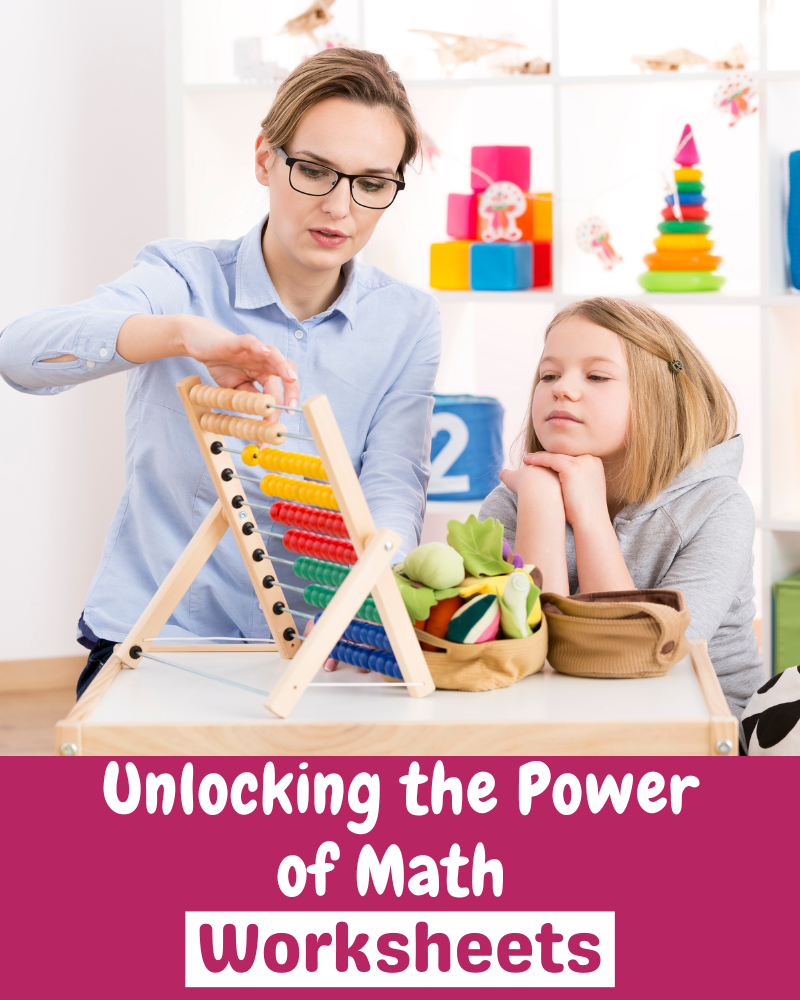Table of Contents
Introduction
Mathematics is a fundamental subject that plays a crucial role in shaping a young child’s cognitive development. Early math education sets the stage for future academic success, as it fosters critical thinking, problem-solving, and logical reasoning skills. One effective tool in this journey is math worksheets, which provide a structured and engaging way for toddlers to explore mathematical concepts.
Why Math Worksheets Matter for Toddlers

Developing basic numeracy skills
A solid grasp of basic numerical concepts is essential for a child’s overall mathematical comprehension. Math worksheets provide opportunities for toddlers to practice counting, recognizing numbers, and associating them with their corresponding quantities. Through repetitive exercises and visual aids, young minds develop a strong foundation in numeracy.
Fostering logical and critical thinking abilities
Math worksheets stimulate a toddler’s logical reasoning and critical thinking skills. By solving problems and puzzles, children learn to analyze, evaluate, and make connections between different mathematical concepts. These exercises assist in developing their ability to think systematically and approach challenges with a strategic mindset.
Enhancing problem-solving skills
Mathematics is synonymous with problem-solving, and math worksheets offer numerous problem-solving scenarios for toddlers to tackle. By encouraging them to find solutions independently, worksheets promote creativity, adaptability, and perseverance. Through trial and error, young children become familiar with various problem-solving strategies and gain confidence in their ability to overcome obstacles.
Boosting confidence and motivation
As toddlers successfully complete math worksheets, they gain a sense of accomplishment and self-assurance in their mathematical skills. This boost in confidence motivates them to explore more complex concepts and challenges, inspiring a positive attitude towards math. Math worksheets create a supportive environment that nurtures a growth mindset and instills a lifelong love for learning.
Selecting the Right Math Worksheets for Your Toddler

Finding the most appropriate math worksheets for your child can greatly enhance their learning experience. Consider the following factors when selecting worksheets:
Determining your child’s current math level
Understanding your toddler’s current math abilities is the first step towards selecting suitable worksheets. Carefully assess their understanding of numbers, basic shapes, and problem-solving skills. This knowledge will allow you to choose worksheets that offer appropriate challenges while building on their existing knowledge.
Considering age-appropriate content
Math worksheets come in various levels of difficulty, designed for specific age groups. Choose worksheets that are developmentally appropriate for your toddler. Opt for materials that align with their age, ensuring that concepts and activities are neither too advanced nor too simplistic for their comprehension.
Aligning with your child’s interests and learning style
To make math worksheets more engaging, select materials that align with your child’s interests and learning style. If your toddler is fascinated by animals, choose worksheets that incorporate animal-themed illustrations or examples. If they prefer hands-on activities, look for worksheets that offer opportunities for tactile learning.
Evaluating the worksheet’s quality and effectiveness
Not all math worksheets are created equal. Evaluate the quality and effectiveness of the materials before introducing them to your toddler. Look for worksheets that provide a clear and concise explanation of concepts, use age-appropriate images, and offer a variety of activities to cater to different learning styles.
Introducing Math Worksheets to Your Toddler
Now that you have selected the right math worksheets for your toddler, it’s time to introduce them in a supportive and engaging manner. Follow these steps to create a positive learning environment:
Creating a positive learning environment
Designate a quiet and comfortable space for your toddler to work on their math worksheets. Ensure that the area is well-lit and free from distractions. Make it a cozy and inviting space by providing necessary materials, such as pencils, erasers, and manipulatives, within easy reach.
Gradually introducing worksheets into their routine
Introduce math worksheets gradually to avoid overwhelming your toddler. Start with a few worksheets per session and gradually increase the quantity as their interest and confidence grow. This approach helps ensure a positive learning experience and prevents burnout.
Making math engaging and fun through games and activities
To keep your toddler engaged and interested in math, incorporate interactive games and activities alongside their worksheet exercises. Use manipulatives, such as blocks or counting chips, to bring math concepts to life. Play math-related games, such as “I Spy” with shapes or “Counting Challenge” with objects in your surroundings.
Reinforcing the importance of perseverance and effort
Foster a growth mindset in your toddler by emphasizing the importance of perseverance and effort. Encourage them to tackle challenging worksheets and celebrate their persistence, even if they make mistakes. Teach them that mistakes are opportunities for learning and growth, fostering resilience and a positive attitude towards overcoming obstacles.
Be sure to check out our Math Worksheets
Exploring Different Types of Math Worksheets

Math encompasses various areas of study, and different types of math worksheets focus on specific concepts. Explore these different categories of math worksheets to provide a comprehensive learning experience for your toddler:
Counting and Number Recognition Worksheets
- Learning numbers 1-10
- Introduction to number symbols
- Counting objects and associating with numbers
- Number sequencing and ordering
- Identifying odd and even numbers
Shape and Pattern Worksheets
- Identifying basic shapes
- Sorting and classifying objects
- Completing patterns and sequences
- Exploring symmetry and asymmetry
Measurement and Comparison Worksheets
- Understanding size and quantity
- Comparing lengths, heights, and weights
- Introduction to basic units of measurement
- Exploring concepts of more and less
Addition and Subtraction Worksheets
- Introduction to basic addition using visual aids
- Learning subtraction through counting and objects
- Building mental math skills through practical exercises
- Solving basic word problems
Tailoring Math Worksheets to Your Toddler’s Progress
Observe your toddler’s understanding and progress while working on math worksheets, and tailor the activities accordingly:
Assessing your child’s understanding and progress
Regularly assess your toddler’s comprehension of mathematical concepts by observing their performance on worksheets and engaging in math-related discussions. This assessment allows you to identify areas that need further reinforcement and concepts that your child has already mastered.
Identifying areas that need further reinforcement
If you notice that your toddler is struggling with specific math concepts, dedicate more time and practice to reinforce those areas. Repeat relevant worksheets, provide additional examples, or seek supplemental resources to support their learning journey.
Providing challenges to extend their learning
If your child shows proficiency in certain math skills, provide them with challenging worksheets to extend their learning. Look for worksheets that introduce new concepts or offer more complex problem-solving scenarios. These challenges stimulate critical thinking and push your toddler’s mathematical abilities to new heights.
Adapting worksheets to address individual needs and interests
Every child learns at their own pace and has unique interests. Adapt math worksheets to cater to your toddler’s individual needs and interests. Modify examples and exercises to align with their interests, ensuring that the worksheets remain engaging and relevant to them.
Incorporating Math Worksheets into Daily Routine
To maximize the benefits of math worksheets, integrate them effectively into your toddler’s daily routine:
Establishing a consistent schedule
Set a regular schedule for math worksheet activities. Consistency helps establish a sense of routine and provides clarity for your toddler. Whether it’s a dedicated math session every day or a few shorter sessions throughout the week, maintain a predictable schedule.
Creating a designated workspace for learning
Designate a specific area in your home as a learning space for math activities. This creates an environment that signals learning and focus. Keep all necessary math materials organized in this space, so your toddler can easily access and engage with them during their worksheet practice.
Balancing worksheet-based activities with hands-on experiences
While worksheets are valuable learning tools, it’s essential to incorporate hands-on experiences alongside them. Engage in activities that allow your child to apply math concepts in real-life situations. Measure ingredients while baking, count objects during playtime, or compare sizes and shapes during a visit to the park.
Encouraging independent practice while providing guidance and support
Encourage your toddler to work on math worksheets independently, promoting autonomy and self-confidence. However, be ready to provide guidance and support as needed. Offer explanations, answer questions, and provide positive reinforcement to keep them motivated and help them overcome challenges.
Tracking and Celebrating Your Toddler’s Math Journey

Support your toddler’s math progress by tracking their achievements and celebrating their growth:
Keeping a record of achievements and milestones
Maintain a record of your child’s achievements and milestones in math, whether it’s completing a challenging worksheet, mastering a new concept, or solving a tricky problem. This record serves as a visual reminder of their progress and encourages them to continue working towards their goals.
Celebrating small victories along the way
Celebrate the small victories as your toddler progresses in their math journey. Acknowledge their efforts, reinforce their successes, and express pride in their accomplishments. Small rewards, such as stickers or a special treat, can further motivate them to continue learning and engaging with math worksheets.
Engaging in conversations about math concepts in everyday life
Mathematics exists beyond the boundaries of worksheets and classrooms. Engage your toddler in conversations about math concepts in everyday life. Discuss shapes, numbers, and measurements during mealtime, playtime, or while running errands. This constant exposure to mathematical thinking fosters a holistic understanding of math.
Involving teachers or tutors to provide additional guidance, if needed
If you require additional guidance or your child demonstrates a strong interest in math, consider involving teachers or tutors who specialize in early math education. These professionals can provide tailored guidance, offer support, and introduce advanced concepts to further enhance your toddler’s mathematical journey.
Frequently Asked Questions (FAQs)
How many worksheets should my toddler complete in a day?
It is important to find a balance between encouraging your child’s mathematical growth and not overwhelming them. Start with a few worksheets per day, assessing your toddler’s comprehension and interest level. Gradually increase the number of worksheets as their confidence and motivation develop.
What should I do if my toddler gets frustrated while solving a worksheet?
Frustration is a natural part of the learning process. When your toddler gets frustrated, provide encouragement, support, and reassurance. Offer assistance by breaking down the problem into smaller steps or demonstrating alternative problem-solving methods. Remind them of their progress so far and emphasize that practice leads to improvement.
Are math worksheets the only way to teach math to toddlers?
Math worksheets are a valuable tool for teaching math to toddlers, but they are not the only method. Incorporate a variety of math activities, such as manipulatives, games, and real-life experiences, to create a well-rounded math learning environment. Combining different approaches ensures a comprehensive and engaging learning experience for your child.
How can I ensure my child stays motivated while using math worksheets?
To keep your toddler motivated, make math worksheets enjoyable and relevant. Use colorful visuals, incorporate their interests, and offer small rewards for completing worksheets. Celebrate their progress and achievements, creating a positive association with math. Keep the atmosphere supportive, encouraging, and full of praise.
Summary
Math worksheets play a crucial role in building a strong foundation for your toddler’s mathematical journey. By selecting the right worksheets, creating a positive learning environment, and tailoring activities to their progress, you can unlock the power of math worksheets and set your child up for success in school and beyond. Remember to celebrate their achievements, maintain open communication, and actively engage in their math journey for optimal growth and development.



